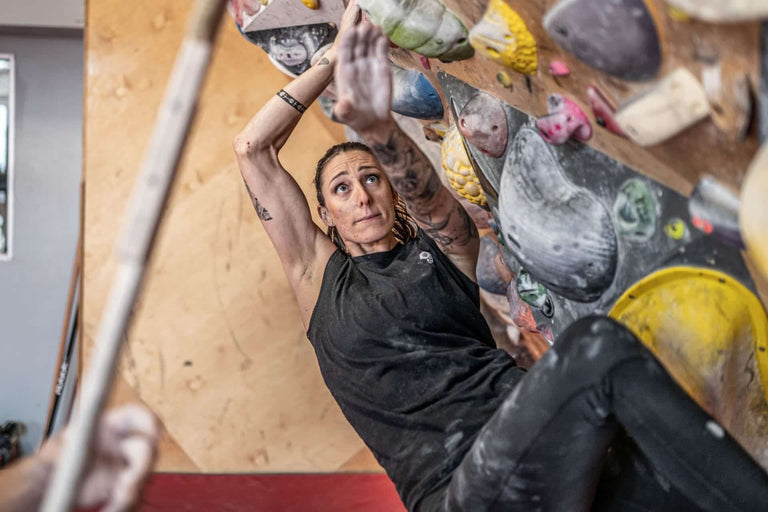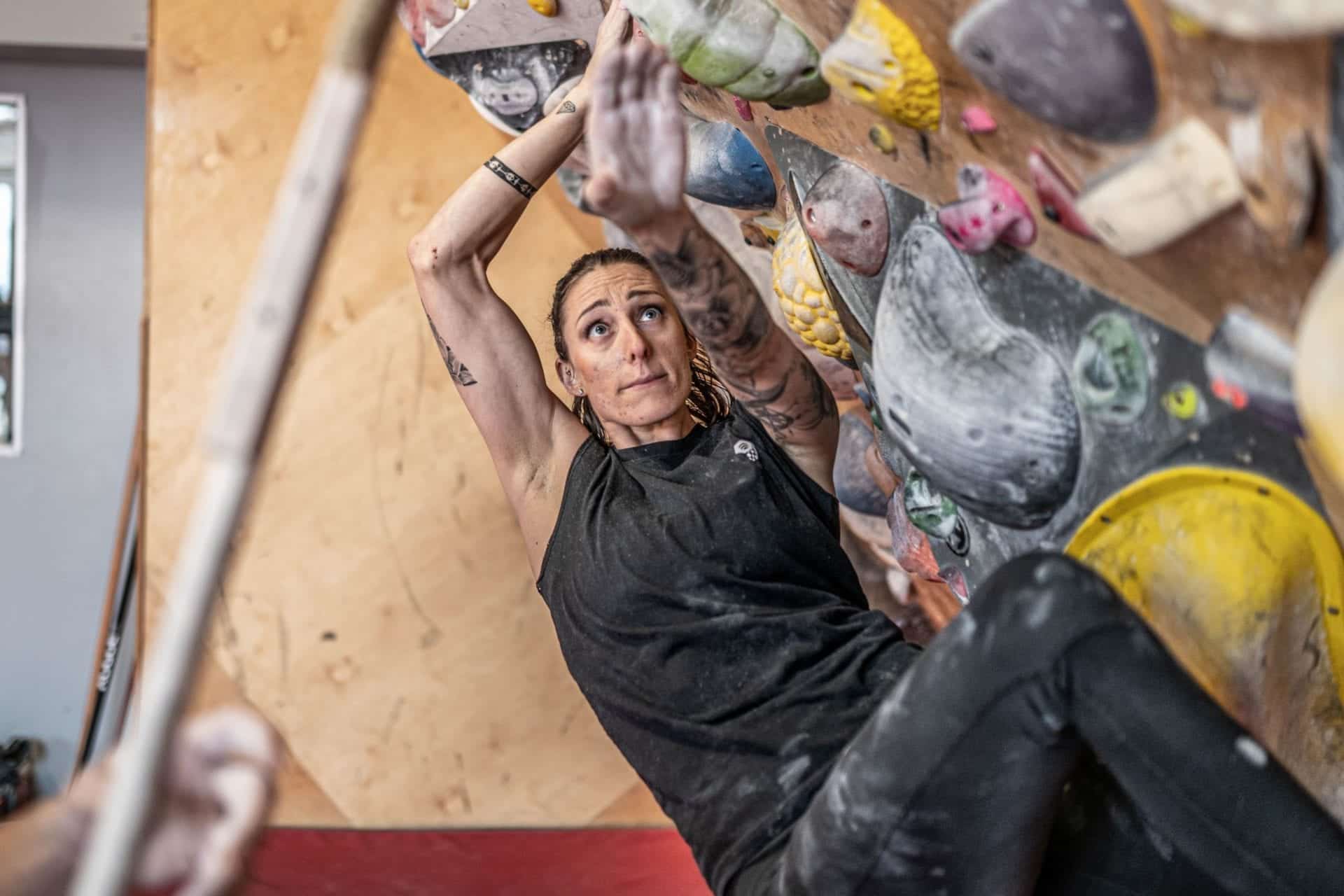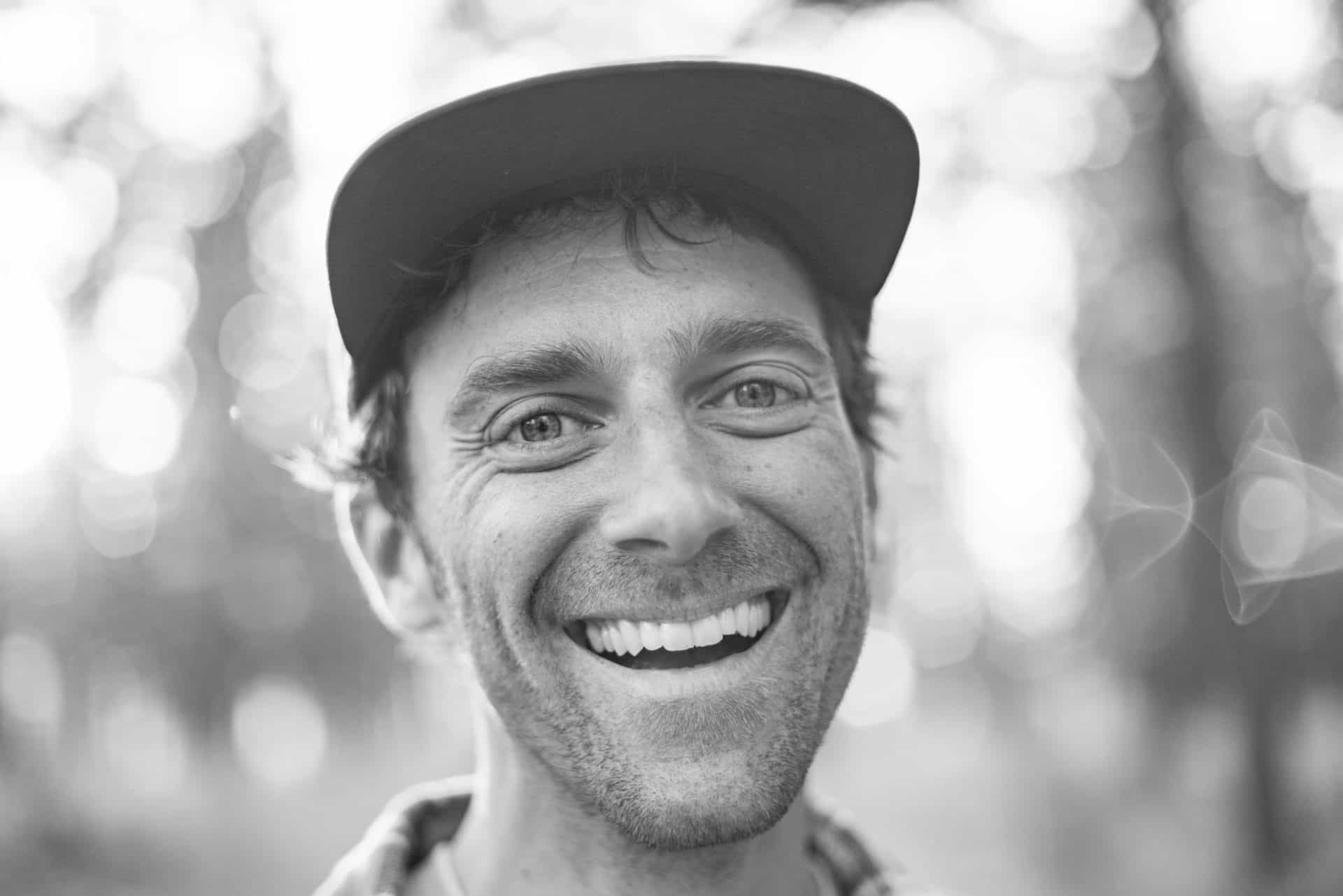
“Taylor Swift is growing on me, but I wasn’t a fan,” says Alex Johnson.
It was the end of August 2019, and Alex, known to her friends and much of the climbing world as AJ, was “stuck” at a T-Swift show in Minneapolis—her girlfriend of several years, Bree, was supposed to go with a co-worker, but couldn’t make it at the last minute. AJ had reluctantly agreed to take the ticket.
“I got a little drunk before going, and I was bobbing my head, having an okay time.”
“This is from my album 1989!” Swift said between songs.
“I thought, huh,” says AJ. “We were both born in 1989. She’s 30, she’s killing it. I’m 30. Maybe I should go for it.”
It in this case was one of the most talked about competition events in the history of climbing—the 2020 Olympics in Tokyo.
In her nearly 20 years of competitive and professional climbing, AJ had won two Bouldering World Cups, five national championships, and countless other podiums. She had climbed dozens of double-digit boulders outside, many of them first female ascents.
But she had just turned 30, and had admitted both privately and publicly that maybe she was done, that she had peaked. It had been three years since she had even entered a national competition. But she also had been coaching and training for nearly a year and was feeling fit, maybe the strongest she’d ever been. In retrospect, it was an epiphany moment.
“I thought, I should try,” she says. “And that was it.”
–––––
AJ’s climbing life began in a familiar and unspectacular way—far from any famous crag or popular climbing town—at a birthday party at Vertical Endeavors in St. Paul, Minnesota, just across the river from her childhood home in Hudson, Wisconsin. That turned into some week-long camps and sporadic visits, which turned into once a week, and soon every day. Without a greater awareness of what rock climbing was, AJ threw herself into the sport.
“That gym was as big as the world was,” she says.
At the time, bouldering didn’t exist as a competitive discipline for youth climbers, and her gym didn’t even have a youth team yet. Often with her mom on belay, she would spend hours traversing back and forth across the gym’s giant arch. Eventually, VE started a small team program.
“There were like four of us, and all of us went to Nationals,” she says. “Back then there weren’t that many kids doing it.”
In search of more formal coaching, AJ soon found Josh Helke, the founder and owner of Organic crash pads, who at the time was working at a nearby gym and became somewhat of a mentor.
If they weren’t at the gym, 12-year-old AJ would climb with Helke and his crew of 20-something friends, bouldering on a local garage woodie.
“I feel like that would be such a no-no today,” she laughs. “My mom would just leave me there for hours.”
Despite her rudimentary training, AJ’s natural abilities saw her quickly to the top. By the time she was in high school, she had won the Youth National Championship (2002), the Adult National Championship (2003), and the Adult Pan American Championship (2004). For several years, she won nearly every competition she entered, but the idea of making a living from climbing still seemed intangible.
She had also excelled in high school track, and her family, strongly rooted in traditional competitive sports, urged her to go to college. After taking state in pole-vaulting, she accepted an athletic scholarship to Minnesota State. She lasted just a year before the pull of climbing was too strong.
She dropped out, and moved to Boulder, Colorado to pursue climbing professionally.
“I thought, oh, to be a pro, you have to go to Boulder,” she laughs.
She quickly did her first V10, first V11, and her first V12. A few small sponsorship contracts helped, but mainly she lived off monthly winnings as she continued to dominate the competition circuit.
In 2008, her first year competing on the World Cup circuit, she won the first Bouldering World Cup held in America, at the Teva Mountain Games in Vail. She took second at the same event in 2009 and another silver in Europe in 2010. Then she won gold again at a 2010 World Cup in Switzerland, making her the first, and still the only American to win a Bouldering World Cup abroad.
At the top of her game, she received an invitation from the Austrian climbing federation to live and train with them in Innsbruck. Exposure to such a high-level team with advanced and organized training was an amazing experience, but for the first time, AJ found herself struggling to keep up with the best. Living and training in Europe was as mentally exhausting as it was physically. Her confidence faltered, and a deep depression set in.
“When I was living in the US and training in Minnesota, I was the best, and I was the only one. I didn’t have people to compare myself to,” she says. “Going over there, climbing and training with people who are climbing circles around you…it definitely showed in my performance.”

On the World Cup circuit, the top six move on to finals. In the last four events leading up to the World Championships in 2011, AJ placed seventh. Still, she competed in the World Championships in August—seventh again.
“Five events in a row, I got seventh. I was really defeated.”
AJ returned home to the US, “a broken climber.” Feeling burnt out the rigorous schedule of training and the pressure of competing, she packed up a stack of crash pads and her dog Fritz into her mom’s van, and headed west.
A weight lifted, AJ stormed the great bouldering areas of the US—Joe’s Valley, Yosemite, Hueco Tanks, Vegas, Bishop.
“I spent months on the road. I could go wherever I wanted, whenever I wanted.”
Between the fall of 2011 and the spring of 2012, she climbed nearly 40 problems V9 or harder and made a flurry of first female ascents.
It was on this trip that AJ first sampled the moves on the Swarm (V13/V14), a legendary crimping testpiece in the Buttermilks outside Bishop, and one of the country’s most iconic hard problems. It was far and away the hardest thing she had ever tried, but the problem seemed to suit her style, and her first session was encouraging.
She returned to Europe in the fall of 2013, this time to boulder outside in the famous areas of Cresciano, Chironico, and Fontainebleau. Feeling fit from a summer training cycle and inspired by a season of hard bouldering outside, the idea of actually trying the Swarm started to gain momentum.
“At the time, no woman had climbed V14 yet. I thought, I was close to doing that
After coming home in January, she immediately packed up and drove to Bishop. From January to March of 2014, she launched an all-out campaign to do the problem, attempting it nearly every climbing day that season. Admittedly her first foray into long-term projecting, the Swarm put her struggles on full public display, as her attempts were documented on social media with the hashtag #siegingtheswarm. She even cleaned and chalked the upper top-out slab, hoping to be the first person to actually summit the boulder after climbing the problem (previous ascents had traversed off on a ramp).
“At first it was cool, because I was getting a lot of support, and publicly documenting the process…I don’t really remember that happening a lot before then.”
But, “going up there alone was really hard a lot of days, because I would go sit under it for three hours and just fail,” she said in a video about the process.
The projecting process, along with the external pressure created by the social campaign, began to take its toll on AJ, who was used to climbing a lot of problems and seeing relatively quick success. With the Swarm, she would hike pads up to the problem, and get just a handful of attempts at the same hard moves each day.
“I was getting weaker, I wasn’t topping anything out, I wasn’t climbing,” she says.
By mid-March it was warming up, and although she had come painfully close on several occasions, she couldn’t link all the moves.
She left frustrated and defeated, but headed back to her new home in Las Vegas intent on returning the following winter. She spent the year climbing hard boulders close to home, and training specifically to peak in time for her trip to Bishop.
But on the first day of 2015, 13-year-old prodigy Ashima Shiraishi claimed the first female ascent of the Swarm, even summiting via the upper slab AJ had pioneered. AJ returned for a week later in January, but still couldn’t send.
“I wasn’t in the physical shape I needed to be in, and I wasn’t at all in the head space I needed to be in,” she says.
In February, Alex Puccio climbed it in a day, and by then the luster of sending the problem started to fade.
“This thing has beat me down six ways from Sunday,” she wrote on Instagram at the end of her trip. “My heart has been in it, out of it, lost somewhere in between, and broken by it. Sometimes it’s the body that doesn’t show up on game day. I know for a fact that I’m physically capable of doing this climb, on any given day up there, but mind over matter really only works to a certain point.”

“I thought, I should try… and that was it.”
Three years went by. She let the Swarm go, spent time traveling, teaching clinics, and pursuing the professional aspects of her climbing career. She had continued climbing at a high level outside, but she wasn’t training for competitions or specific outdoor projects, and she had begun to feel a lack of purpose. She had considered the idea of coaching and teaching, but when her hometown gym of Vertical Endeavors offered her a full-time head coach position, she initially scoffed at the idea.
“I thought, no way, I’d never move back to Minnesota, ever,” she said.
But her life in Vegas had begun to feel stagnant.
“I was misbehaving, partying a lot. I sort of knew if I didn’t leave, that I’d stay on that path.”
Six months later, in early 2018, she finally accepted their offer, and she and Bree moved back to where it all began.
Coaching gave AJ not only a sense of purpose, but a renewed energy in her own climbing.
“I was definitely bitter toward competing. I didn’t like the way the setting was going, but it was because I wasn’t good at it. Coaching brought me back into loving learning the subtleties of the movement. Instead of getting frustrated because I couldn’t do it, it was why? Why can’t I? And why can someone else? What are they doing?”
They would break down different problems, do repetitions, and study the intricacies of technique.
“I think I probably learned as much if not more than the kids did. I owe a lot to them for getting me in shape again and refreshing my perspective.”
And AJ’s role as a coach went beyond the climbing wall. In May of 2018, one of the kids on her team mentioned several times that she had been bullied at school, but wouldn’t say the reason. Why would this cool, smart, and funny young kid get bullied? AJ pressed her.
“Weeeell, I like girls,” she said.
“I was like, it’s 2018 and people are still getting bullied for that?” AJ says. “She didn’t know she had me as an ally.”
Later that day, AJ posted on Instagram, “I’ve been dating both boys and girls since I was 17. Growing up I didn’t think this was cool so I never talked about it. I was wrong, it is pretty cool.”
Coming out publicly wasn’t news for those close to AJ, but as one of the first pro climbers to do so, she received an overwhelmingly positive response.
“For me, it’s a big part of who I am, but it’s just a part. But for people who need it, they’re like, ‘yes, finally a role model.’”
After nearly a full year coaching and training with her team kids, AJ was strong, fit, and moving well.

“I thought, I’ve never really applied myself and fully committed to training the potential that I have. I’ve always relied on talent. I’ve won World Cups just by showing up. I wonder if I could make it to the Olympics if I really tried.”
After her Taylor Swift moment, AJ fully committed to Tokyo 2020—she cleaned up her diet, cut out alcohol, and began training harder than ever before.
In September 2018, she ended her three-year hiatus from competition by taking first at the Woman Up comp in Los Angeles. This past February, she flashed her way through the semi-finals at ABS Nationals to take second place overall. She also returned to compete in the entire Bouldering World Cup circuit, finishing the season as the top-ranked American. In late September 2019, AJ and Bree moved to Salt Lake City so she could train full-time with Team USA, in preparation for Olympic qualifier events.
In August 2019, 18 year old Brooke Raboutou became the first American to qualify for the Tokyo Olympics and on December 01, 2019 Kyra Condie took the second and final spot representing the women on Team USA.
AJ gave herself time to be disappointed and then a friend reminded her:
“A gold medal is cool, but if you’re not enough without it, you’ll never be enough with it.”
AJ took some time, climbed outside a bit, then got back to the hard work and responded, “I’m finding me again. I’m a badass.”

–––––
There are many things that each of us can learn from the journey that AJ is on and has so openly shared with the public:
Find a goal that motivates you tirelessly.
Be courageous and stand for yourself and others.
Find confidence in your abilities.
Search for something that intrinsically motivates you.
Experience the joy of working with and teaching others.
But maybe just one of the messages that we can all take away from Alex’s journey is that the game is never over until you decide it’s over. Alex has shown us that repeatedly over the last 2 years. In February 2019, she stood on the 3rd place podium for Bouldering Nationals, competing with other women nearly half her age. She stood there an inspiration, showing fans, of all ages, the importance of hard work, determination, and perseverance. The podium isn’t what matters, it’s knowing that when the game is finally over, you’ve given it your all and have found peace in putting everything on the line.
When asked what she’s going to do next?
AJ closed with, “I’m gonna get back to all the goals I left behind. I’m gonna go do the Swarm.”
We can’t wait to watch.



